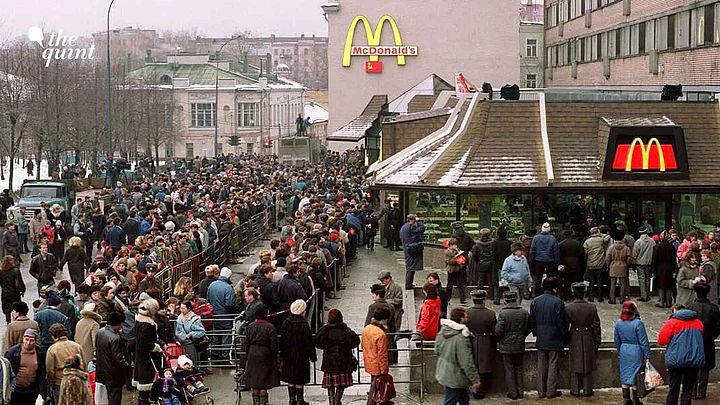"Tell us, what is this Beeg Mak?"
"The Bolshoi Mak, comrades, is like something you’ve never tasted before. You take a bun, a very tasty bun, and you cut it in half. Then you add some grilled meat, top quality meat, mind you, not like the meat we get here. Then some cheese, then very many vitamins and…"
This conversation is an excerpt from an article published by the Washington Post on 31 January 1990.
It was in 1988 that McDonald's got permission from the communist party to launch their branches in the Soviet Union.
On 31 January 1990, on Pushkinskaya Square in Moscow, the shop's doors opened to customers for the first time.
Reports say that more than 5,000 people showed up on the first day.
There were militiamen present to prevent a riot, and the hubbub of the day was continuously being recorded by the TV cameras.
Moscow McDonald's, on that day, set a world record by serving burgers to more than 30,000 visitors.
People did not care that they had to stand in line for more than six hours. It was fast food. It was McDonald's. It was American.
'One of Our Proudest and Most Exciting Milestones'
Often considered as the triumphant symbol of American capitalism, McDonald's has more than 39,000 restaurants in over 100 countries.
Soft power can't get any more powerful than that. Even China has McDonald's.
McDonald's first stint with Russia was actually 14 years before the first restaurant opened there.
During the 1976 Olympics in Montreal, the Russian Olympic team used the Big Mac Bus, according to the New York Times.
"In the history of McDonald's, it was one of our proudest and most exciting milestones," Chris Kempczinski, the current chief executive of McDonald's, wrote in a note to the franchises after the decision to exit Russia.
"After nearly half a century of Cold War animosity, the image of the Golden Arches shining above Pushkin Square heralded for many, on both sides of the Iron Curtain, the beginning of a new era."
And he's right. Imagine a state that for decades pushed the idea that its model of governance and economics is superior to the one implemented in the country of capitalists, who in Lenin's words, would "vie with each other for the rope contract" when the socialists would hang them.
McDonald's entry into the Soviet Union, in one way or another, completely ripped apart that idea.
"This is a huge deal. They opened this McDonald's to enormous fanfare. In fact, the picture of that line is still one of those kind of iconic images that people associate with Russia's transition to capitalism even though it happened before the Soviet Union collapsed," Kristy Ironside, a Russia historian at McGill University told NPR.
American food outlets since then have flourished in Russia, and perhaps KFC is even more popular than McDonald's today. Pizza Hut, Burger King, and Subway are immensely popular too.
It was, however, McDonald's that really set the ball rolling.
McDonald's and Pizza Hut, says Mikhail Kostin, a Moscow-based food critic told the Washington Post, "changed the restaurant industry in Russia."
Gorbachev's Role
The launch of McDonald's in the Soviet Union was possible because of political and economic reforms that were initiated by one man, Mikhail Gorbachev.
Known as perestroika and glasnost, the reforms were meant to kick-start the stagnant economy of the Soviet Union in the 1980s.
Opening up to American companies and investments was a big part of these reforms, and despite being despised by the veteran hardline anti-capitalists in the Soviet government, Gorbachev even appeared in an infamous commercial for Pizza Hut where a man criticises his presidency while the son praises the reforms.
Towards the end, the family cheers "Hail Gorbachev!" as a voiceover says, "Nothing brings people together like a nice hot pizza from Pizza Hut," as reported by the Washington Post.
"Because of him, we have Pizza Hut," the mother says, pointing at Gorbachev.
What Now for McDonald's?
Now, because of the Russian invasion of Ukraine, McDonald's is shutting shop in Russia after more than 30 years, becoming one of the biggest global brands to leave the country to punish Vladimir Putin's actions.
Around 84 percent of its almost 850 restaurants will reportedly be sold to a local buyer who will not be permitted to use the McDonald's name, logo, branding, and menu.
Earlier this week, it put out a statement that said that it was in the process to sell hundreds of its restaurants in Russia.
"The humanitarian crisis caused by the war in Ukraine, and the precipitating unpredictable operating environment, have led McDonald's to conclude that continued ownership of the business in Russia is no longer tenable," a part of the statement read.
Stories are emerging of people travelling long distances for a McDonald's meal.
"I came to this McDonald's especially from Samara, only 250 km," one person wrote online. "I remembered the atmosphere and happily dived into it. The food and burgers are just as tasty and flavourful. Thank you for being relatively close by," as reported by Reuters on 17 May.
"I miss McDonald's, so when I go to St Petersburg, I drop by and treat myself to a Big Mac," 32-year-old Irina said.
(With inputs from NYT, Washington Post, and NPR.)
(At The Quint, we question everything. Play an active role in shaping our journalism by becoming a member today.)
